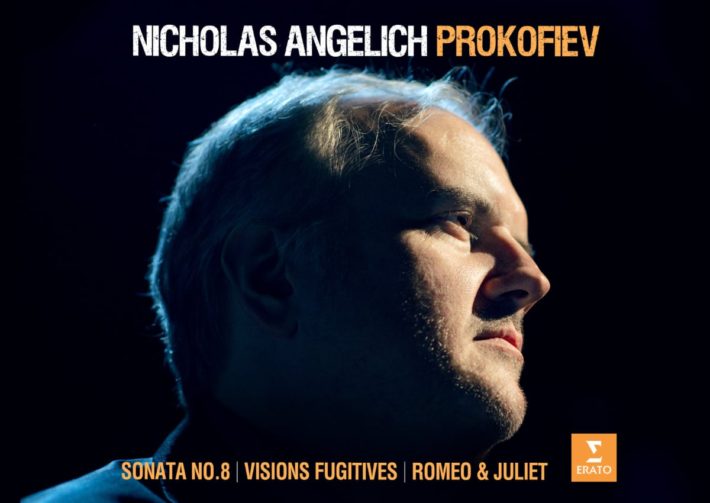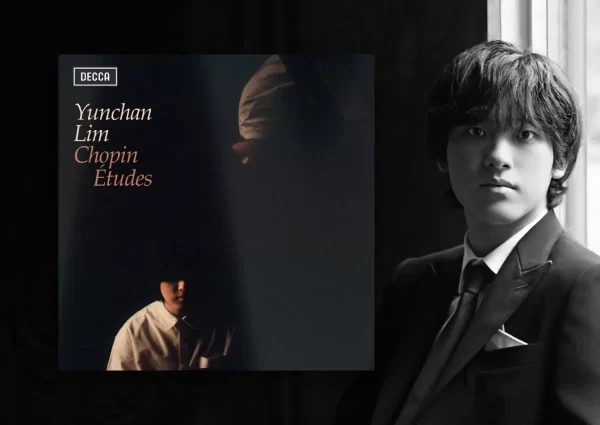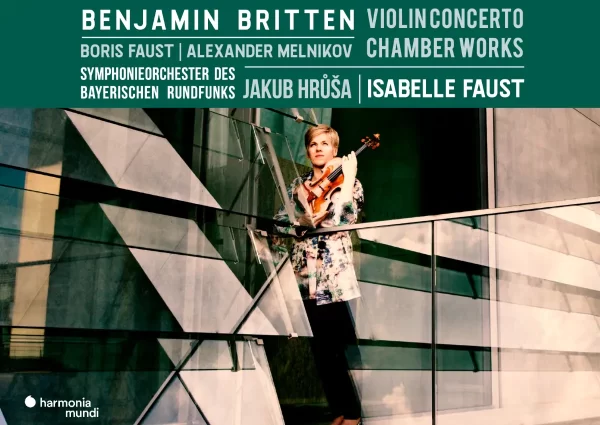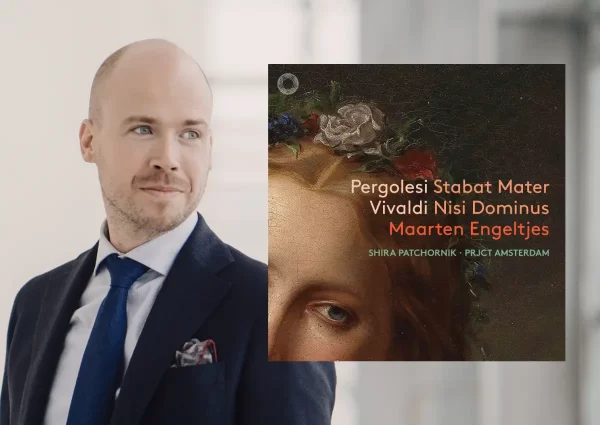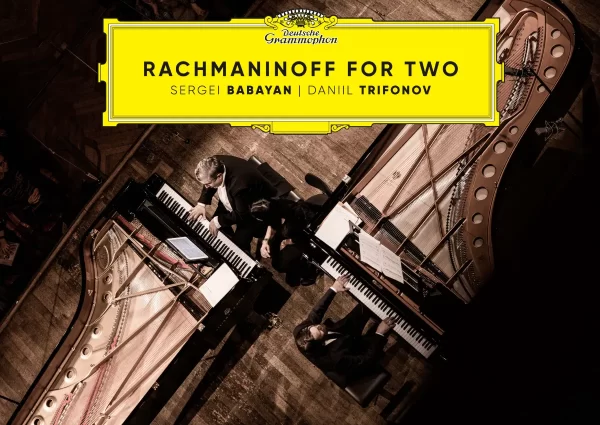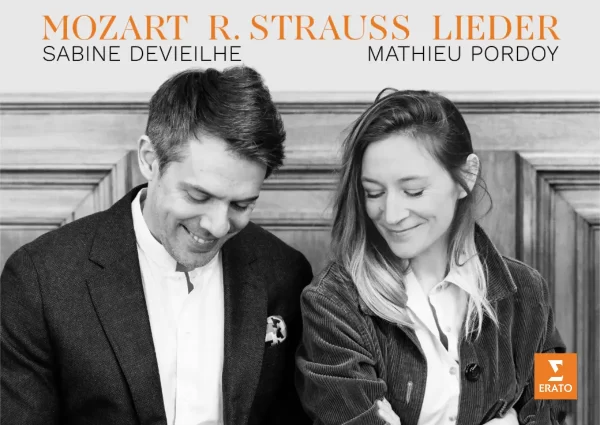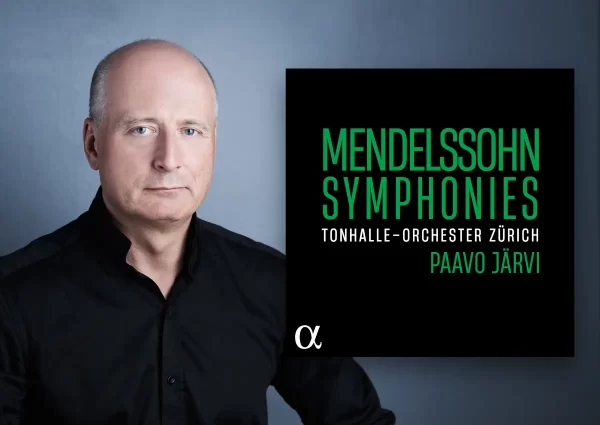In his newest release, Nicholas Angelich presents some of Sergei Prokofiev’s finest and most musically complex works for solo piano.
The 8th Sonata (1944) is the last of the War Sonatas trilogy but has a distinctly different flavor from its two predecessors, the cataclysmic A Major and the martial B-flat. It is curious that the composer would choose to continue in the same key as the 7th Sonata, but this underlying commonality only does more to highlight a contrast in personality. An unexpectedly lyrical theme greets our ears in the Andante Dolce (track 1). But…we should not be fooled by the gentleness: chromaticism that undulates just beneath tonality sparks a tension whose intensity can flare up and dissipate quite suddenly. For all its instability, the contemplativeness of the movement gives Angelich’s musicianship a chance to shine. Moments like 4’20” onwards show the artist’s sophistication, a minimalism that is simultaneously delicate (the upper voice seems like the faraway clangs of a bell) and encroaching (the lower voice mimics an ominous growl).
Prokofiev labels the middle movement (track 2) Andante sognando. Angelich embodies the latter term (“dreaming”) through a nuanced gradation of softer dynamics. The opening theme, free from any atonality, might be symbolic of a longing reminiscence of bygone times. The grotesque element is not abandoned for long, however, as dissonances start to cloud the theme. Angelich approaches these distorted iterations with an unfailing innocence in a skillful representation of Prokofiev’s signature irony.
Related Classical Music Reviews
- Review: “Silver Age” – Daniil Trifonov Plays Stravinsky, Prokofiev, Scriabin
- Review: Vadym Kholodenko Plays Prokofiev’s Solo Piano Music
- Review: Prokofiev – Symphony No. 5 – Oslo Philharmonic, Petrenko
The dynamic montage that is the Vivace (track 3) is where much of the sonata’s action resides. In a commendable performance, the pianist displays agile fingerwork in the recurring themes and runs to impart an impish, even sinister humor. At the same time, his rounded tone adequately tames the cacophony of the louder sections all without losing the sense of tumult. If we’re to look at comparative interpretations, we must revisit Daniil Trifonov’s take on this Sonata (DG, 2o2o, reviewed here). The contrast of the sections and personalities is even more augmented in this performance. Drier runs, sharper staccatos, and more abrasive chords (a good thing here), emphasize the movement’s eccentricity. Angelich may sound a bit labored in the final section, but Trifonov really lets the momentum go to bring the frenzied madness to its apex.
In the Op. 22 Visions Fugitives (1915-1917) as in the 8th Sonata, Angelich brings out a sensitivity that is perhaps foregone in other interpretations in favor of a harsher sarcasm. Lentamente (track 4) is a perfect example: the wistful melody evokes a delicate solitude while the lower parallel harmonies are warm and velvety. In the same vein, the Allegretto (track 6) seems to take its time when compared to other renditions like Vadym Kholodenko’s (Harmonia Mundi, 2020, reviewed here) but has a precious element of reflection. And another standout track, Con eleganza (track 9), might only be a fleeing whisper in its duration, but the performer here manages to capture its charming whimsy.
Prokofiev completed his 10 Pieces from Romeo and Juliet not long after writing the full ballet version. In a movement like the Montagues and Capulets (track 27), tempo can make a significant impact on character. A brisker pace breeds a furious excitement that some prefer while a slower one is perhaps more faithful to the ballet (the particular scene in question depicts a stately dance). Angelich opts for the latter, and his musical choices in sound quality and dynamics take this visual element into consideration. Given the slower tempo, though, I do feel that the beginning is somehow restrained, in need of more oomph reminiscent of the orchestral version’s quintessential brass section. But maybe there is a purpose to his choice–if we listen through the opening section, Angelich gradually increases power and intensity. The middle section, however, could definitely use more movement. Listeners might find themselves wandering through a more or less measured approach.
The sound engineers at Erato do an excellent job in capturing the pianist’s nuances and the instrument’s warmth – this balances out some of the grinding dissonances for a thoroughly enjoyable listening experience. Although there might be minor reservations, they do little to deter from a recording strongly recommend for any Prokofiev aficionado.

Prokofiev – Piano Sonata No.8 in B flat Op.84, Visions fugitives Op.22, 10 Pieces for piano Op.75 (excerpts)
Nicholas Angelich – Piano
Warner Classics / Erato, CD 9029526768
Recommended Comparisons
Read more classical music reviews or visit The Classic Review Amazon store
Follow Us and Comment:
Get our periodic classical music newsletter with our recent reviews, news and beginners guides.
We respect your privacy.

